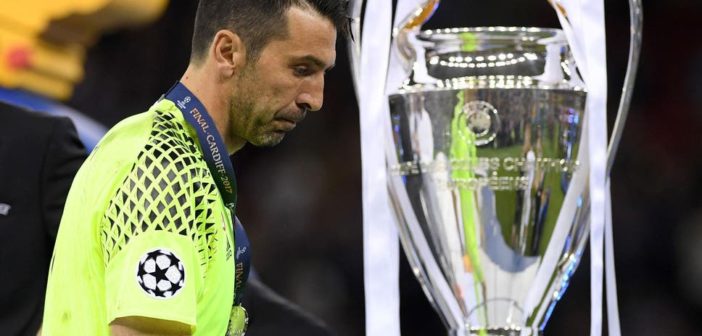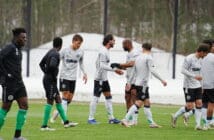The iconic players who have never lifted the iconic trophy.
The Champions League, or the European Cup, has been a stage for some of the world’s greatest players to prove themselves. Some have had the privilege of putting their hands on the biggest club honour in European football. But for others it has become too much of a familiar story, coming so close, yet so far. Here we look at five players never to be crowned, European Champions.
Lotthär Matthäus

Lotthar Matthaus alongsode David Beckham in 1998/99 Champions League group stage
Credit – The Guardian
Germany’s Lotthär Matthäus has had heartbreak in the European Cup on a few occassions.
After his side Bayern Munich saw off Real Madrid in the 1987 semi-final, they took on Porto in the final in Vienna.
The Bavarians took the lead midway through the first half through Ludwig Kögl. However Porto scored twice in quick succession in the final 15 minutes, to deny Bayern and Matthäus the trophy.
The 1990 World Cup winner did get a second chance at European glory. 12 years later, aged 38, he started for Bayern Munich in the 1999 Champions League final at the Camp Nou against Manchester United.
Bayern took the lead after six minutes through Mario Basler, and controlled the game throughout, hitting the woodwork twice.
With ten minutes remaining, Matthäus was substituted, from the bench he had to watch an almost identical repeat of his side’s collapse in 87′. Teddy Sheringham and Ole Gunnar Solskjaer’s goals in stoppage time helped United complete the treble, and helped inflict more pain on the German legend.
Matthäus retired in 2000 and the following year Bayern Munich would finally lift the European Cup after they beat Valencia in the final at the San Siro.
Eric Cantona

Eric Cantona reached the Champions League semi-final with Manchester United in 1997. Here he is celebrating with Andy Cole
Credit – Football 365
Eric Cantona, was at Marseille for three seasons. However his playing time at the French side was restricted. He was left out of the squad for the 1991 European Cup final against Red Star Belgrade, in which Marseille lost 5-3 on penalties.
Marseille sold Cantona that summer to Nimes, however he would move to Leeds United six months later, where he would win the First Division title. But the Yorkshire side were knocked out by Rangers in the second round of the 1992/93 European Cup.
Cantona scored a consolation goal in the second leg, but 22 days later he moved to Leeds’ arch rivals, Manchester United, where he claimed four Premier League titles.
Cantona’s side struggled in the Champions League in the early 1990s, but in 1997 they reached the last four after thrashing Porto 4-0 in the quarter finals. They faced Borussia Dortmund , where United were beaten 2-0 over two legs by the eventual winners.
24 hours after the semi-final exit, Cantona informed manager Sir Alex Ferguson that he was retiring at the end of the season. Two years later as already mentioned, United lifted their second European Cup.
Gianluigi Buffon

Gianluigi Buffon in despair following the 4-1 defeat to Real Madrid in Cardiff
Credit – The Independent.ie
The Italian shotstopper has had his fairshare of pain in the European Cup over his 25 year career.
In his second season at Juventus he reached the Champions League final, where they faced fellow Italian giants AC Milan at Old Trafford.
With both sides’ deadlocked after 120 minutes, the 2003 final went to penalties. Buffon managed to save Clarence Seedorf’s and Kakha Kaladze’s spotkick, but was unable to keep out Andrey Shevchenko’s penalty as Milan won the shootout 3-2.
Buffon was then beaten 3-1 by Barcelona in the 2015 Champions League final in Berlin, which also denied Juve the treble.
But two years after the defeat to Barca the Bianchoneri reached the Champions League final again, where they faced record holders, and La Liga Champions Real Madrid.
But it would be another forgetful one for the Italian in Cardiff, as Juventus were beaten 4-1 by Zinedine Zidane’s side.
Buffon, now aged 42, is still playing for Juventus. Though in the twilight of his career, there’s still the possibility of success in this great competition.
Billy Bremner

Billy Bremner captained Leeds in the 1975 European Cup Final
Credit – National Football Museum
Billy Bremner captained Leeds United into the European Cup in 1969/70.
After victories over Lyn Oslo, which saw Leeds win 16-0 on aggregate, Ferencvaros and Standard Liege, they faced fellow British opponents, Celtic in the semi-finals. However the Scottish Champions’ ended Leeds’ European dream with a 3-1 aggregate win.
Bremner and Leeds would not return to Europe’s top table until the 1974/75 season. A 3-1 aggregate victory over Barcelona sent the Yorkshire side to the final in Paris, against Bayern Munich.
Unfortuantely for Leeds, goals from Franz Rothe and Gerd Müller gave Bayern a 2-0 victory at the Parc de Princes in what was an ugly affair, with crowd trouble making it a final to forget.
The late Billy Bremner left Leeds for Hull City the following year and Leeds would not play in the European Cup until 1992.
Ronaldo Nazario

Ronaldo’s performance at Old Trafford received applause by the United supporters
Credit – The Telegraph
Probably the most debatable on the list, but we’ll keep him on here anyway.
The ‘original’ Ronaldo has won almost every individual honour you could win in football minus the Champions League.
The Brazilian moved to Real Madrid from Inter in 2002, just a few months after Los Blancos triumph in the competition where they beat Bayer Leverkusen 2-1 in the final at Hampden Park. His most notable performance in Europe that season came in the quarter final second leg at Old Trafford. He scored a hat-trick at the Theatre of Dreams which helped Real to a 6-5 aggregate victory.
In the semi-final, Ronaldo’s 23rd minute opener helped the Spanish giants to a 2-1 first leg victory over Juventus. However, the return leg was a dissapointing one as Juventus defeated Real 3-1. Denying Real a third final in four seasons.
The semi-final would be the closest the striker would get to the final with Los Blancos. They were beaten in the 2004 quarter-finals by Monaco, which was followed by two round of 16 exits to Juve and Arsenal.
In the January transfer window of 2007, Ronaldo moved to Inter’s fiercest rivals Milan. Because he had already featured for Real Madrid in that seasons’ Champions League, it meant he was cup tied and unable to feature the Rossoneri.
Even without the Brazilian hitman, AC Milan made it to the final and two years after their defeat to Liverpool in Istanbul, they got their revenge with a 2-1 victory in Athens. Ronaldo did join in with the celebrations, but would not recieve a medal.
![Prost International [PINT]](https://prostinternational.com/wp-content/uploads/2021/08/PINTtFontLogoRoboto1536x78.jpg)


